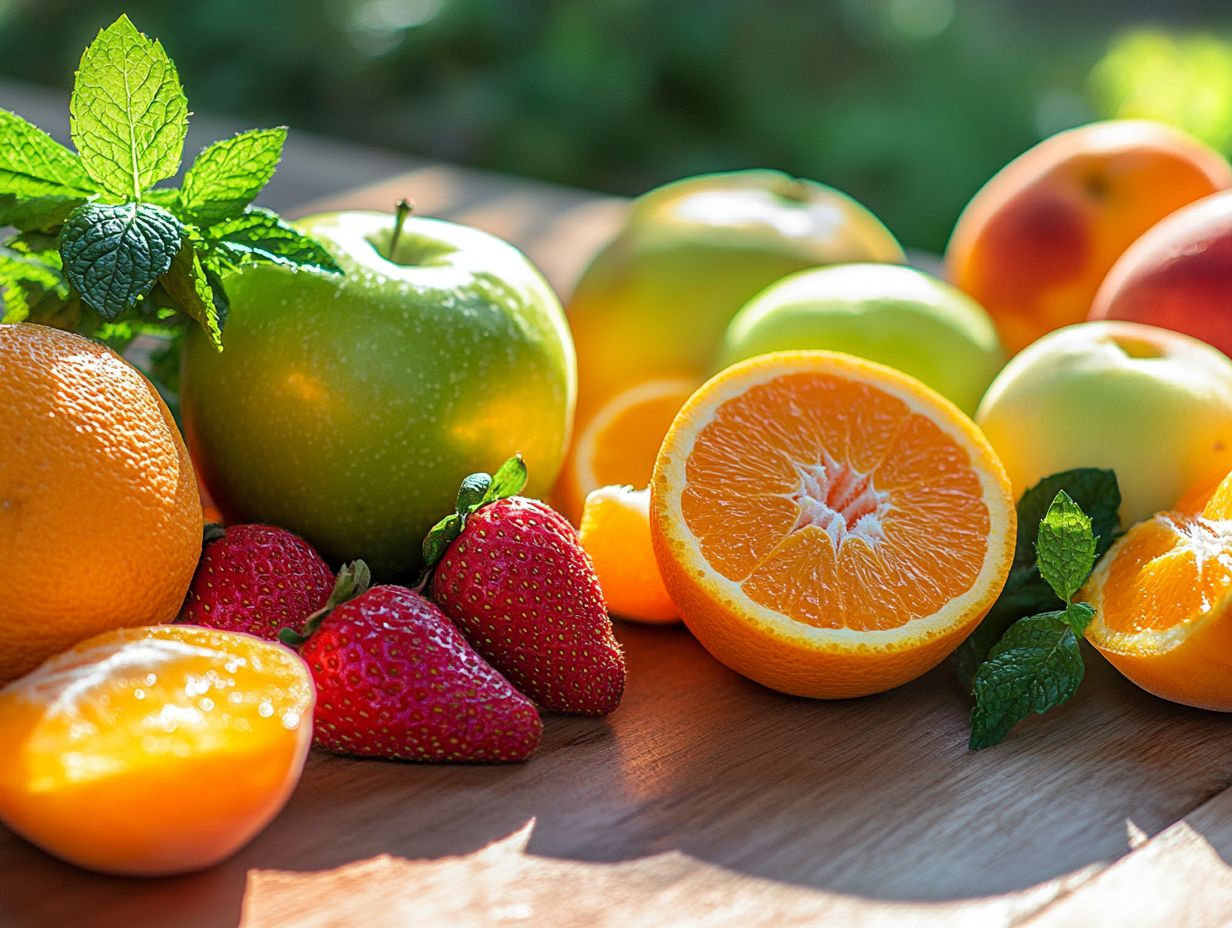The Benefits of Eating Seasonal Fruits
Eating seasonal fruits is a delicious way to boost your health! It brings a wealth of health benefits that can enhance your well-being, support the environment, and invigorate the local economy.
From the nutritional advantages of fresh summer berries to the warm comfort of baked apples in fall, seasonal fruits and vegetables deserve a prominent place in your diet.
You’ll find tips for seamlessly incorporating these fruits into your meals and uncover a treasure trove of delicious recipes that will inspire your culinary creativity and adventures.
Embrace and celebrate the vibrant flavors that each season has to offer, whether through fresh produce or even frozen produce when necessary!
Contents
Key Takeaways:
- Eating seasonal fruits provides nutritional, environmental, and economic benefits.
- The most nutritious seasonal fruits include berries, apples, citrus fruits, stone fruits, and seasonal vegetables like broccoli and asparagus.
- Incorporating seasonal fruits into your diet can be done by shopping locally at farmers markets, joining local farms that offer subscriptions for fresh produce, or growing your own.

Why Should You Eat Seasonal Fruits?
Eating seasonal fruits not only elevates the taste of your meals, but it also brings significant health benefits that can enhance your overall well-being. Seasonal eating involves choosing fruits and vegetables that are harvested at their peak ripeness, ensuring you enjoy produce that is both more rich in nutrients and flavorful than those that are out of season.
This practice aligns well with dietary guidelines that recommend variety in diet and sustainable eating. By incorporating local produce into your diet and frequenting farmers markets or community-supported agriculture programs, you support your local economy and indulge in the freshest fruits and vegetables available.
This approach aligns seamlessly with dietary guidelines that advocate for sustainable eating while boosting your immune system through a diverse and vibrant diet. The USDA and Certified SC Grown programs emphasize the importance of local and seasonal eating for optimal health and community support.
1. Nutritional Benefits
Seasonal fruits provide exceptional nutritional benefits that enhance your overall health and well-being, making them a critical component of any balanced diet.
Incorporating a variety of these fruits into your meals elevates your culinary experience and provides a wealth of essential vitamins, minerals, and antioxidants that fortify your immune system. For example, strawberries are bursting with vitamin C, a crucial ally in boosting your body’s defense mechanisms.
Similarly, seasonal vegetables like broccoli and asparagus are rich in fiber and vital nutrients that support gut health. Opting for these nutrient-rich choices often yields greater health advantages compared to their non-seasonal counterparts, which may lack the same freshness and nutritional value.
This makes a compelling case for prioritizing seasonal produce as a strategy for aligning with dietary guidelines and achieving optimal health. For those who need to supplement, frozen produce or canned produce can also be nutritious alternatives when fresh seasonal options aren’t available.
Start enjoying seasonal fruits today for a healthier lifestyle!
2. Environmental Benefits
Choosing seasonal produce is not just a treat for your taste buds; it’s also a powerful step toward enhancing your health and benefiting the environment a way to eat sustainably. Environmental benefits include reducing food miles and minimizing the amount of greenhouse gases produced during transportation. This promotes more sustainable agriculture.
When you opt for local and seasonal fruits and vegetables, you significantly reduce your carbon footprint. This mindful choice minimizes the need for long-distance transportation, which often relies on fossil fuels that contribute to greenhouse gas emissions. Embrace the season and support sustainable farming practices today! You prioritize biodiversity and soil health, promoting methods that are gentler on the environment and help preserve local ecosystems.
Sustainable eating practices like these benefit both your health and the health of the planet. This conscious consumption strengthens community bonds. By fostering collaboration with local farmers, you contribute to a healthier planet and bolster the local economy. It’s a win-win for you and the world around you.
Programs like SNAP and Good Harvest encourage the consumption of local and seasonal produce, highlighting its role in community growth and sustainability.
3. Economic Benefits
Eating seasonal fruits isn t just a delight for your palate; it also brings tangible benefits to the local economy, playing a crucial role in community growth and sustainability. Experts like Stephanie Brown, Nick Blackmer, Tatiana Maksimova, Judy Simon, Sherry Gray, and Jennie Schmidt advocate for these benefits.
When you choose to purchase these products from farmers’ markets or community-supported agriculture programs, you re ensuring that a larger share of your food dollar remains within your community. The USDA highlights that local food systems can generate up to four times more economic activity than traditional food supply chains.
By buying locally, you re not just supporting farmers; you re also driving significant revenue for regional producers. This gives them the means to reinvest in the agricultural landscape that sustains your community. This sustainable approach ensures a more resilient food system for all Americans.
This creates a powerful cycle of support that stabilizes local farms while enriching community life. It fosters meaningful connections between producers and consumers while promoting more sustainable agricultural practices. Embrace the seasonal bounty and watch how your choices ripple through the local economy.
What Are the Most Nutritious Seasonal Fruits?
Discovering nutritious seasonal fruits will enhance your diet with a delightful array of flavors and health benefits unique to each season. Embracing this variety not only enhances your meals but also ensures a diverse and nourishing eating experience all year round.
1. Berries (Summer)

Berries, like strawberries and blueberries, are quintessential summer fruits that delight your palate and deliver impressive nutritional benefits. They are among the most nutrient-dense food options available during the summer season.
Their vibrant hues indicate the multitude of health advantages they provide, including a wealth of antioxidants that help combat oxidative stress and inflammation. These nutrient-rich gems are brimming with essential vitamins, particularly vitamins C and K, crucial for immune function and bone health.
To fully enjoy their peak ripeness during the summer, consider tossing a handful of fresh berries into your morning smoothies for a refreshing start or using them as a vibrant topping for yogurt and oatmeal. Visiting your local farmers market can offer you the freshest selections available.
Incorporating berries into your salads or experimenting with them in homemade desserts, such as berry tarts, can elevate your summer meals into not only delicious options but also wholesome choices that support a balanced diet.
2. Apples (Fall)
Apples are the quintessential fall fruit, celebrated for their versatility and impressive health benefits, making them a must-have in your seasonal diet.
Rich in dietary fiber, apples support your digestive health and help you maintain a healthy weight by keeping you feeling full. Their high vitamin C content plays a vital role in boosting your immune system, making them an excellent choice as the temperatures drop.
Whether you savor them as a crunchy snack, toss them into salads, or bake them into delightful desserts like pies and crumbles, apples offer a world of culinary possibilities. In many cultures, they are deeply intertwined with fall harvest traditions, symbolizing abundance and the changing of the seasons.
This makes them not just a delicious treat but also a cherished part of autumn celebrations.
3. Citrus Fruits (Winter)
Winter invites you to indulge in the vibrant world of citrus fruits, celebrated for their refreshing flavor and impressive immune-boosting properties. These fruits provide substantial health advantages, particularly in the colder months when the immune system can use extra support.
Rich in vitamin C, fruits like oranges and grapefruits not only deliver a delightful burst of taste but also play a vital role in enhancing your health, especially as temperatures drop. Their abundant antioxidants work tirelessly to fend off colds and flu, making them an essential component of your winter diet.
To reap these benefits, consider weaving citrus into your hearty winter meals. Imagine salads adorned with mixed greens and citrus segments, or warm beverages infused with slices of orange or lemon, adding a zesty twist to your cozy moments.
Snacking on fresh citrus or incorporating their juices into marinades can elevate your culinary experience while supporting your immune system making winter not just bearable, but downright delightful.
4. Stone Fruits (Spring)
Spring brings with it the delightful arrival of stone fruits, like cherries and peaches, celebrated not only for their juicy taste but also for their remarkable health benefits.
These luscious fruits, with their smooth skins and sweet, succulent flesh, are brimming with essential vitamins. Vitamin C plays a crucial role in boosting your immune function, while vitamin A is vital for maintaining eye health. Stone fruits also pack a potassium punch, promoting heart health, and their dietary fiber content supports healthy digestion. Whether purchased fresh from a grocery store or frozen, they provide significant nutritional benefits.
Their versatility in the kitchen is truly impressive; they shine when enjoyed fresh, perhaps drizzled with a touch of honey, and they elevate pies, tarts, and even savory dishes like salads or salsas to new heights.
You’ll notice that stone fruits really hit their stride from late spring to early summer, making this the perfect time for you to incorporate these nutritious wonders into your meals and snacks.
How Can You Incorporate Seasonal Fruits into Your Diet?
Incorporating seasonal fruits into your diet can be a delightful and rewarding experience. Whether you visit a local farmers market, join a community-supported agriculture program, or simply look for fresh produce at your grocery store, the options are plentiful.
Incorporating seasonal fruits into your diet is not only a simple endeavor but also a profoundly rewarding one. You have the opportunity to elevate your health and unleash your culinary creativity, all while supporting local farmers and bolstering the economy around you. Additionally, embracing the benefits of eating seasonal berries can enhance your meals and provide vital nutrients.
1. Shop at Local Farmers’ Markets
Shopping at local farmers’ markets is an exceptional way for you to enjoy fresh, seasonal fruits while simultaneously supporting your community and bolstering the local economy.
These lively markets present a remarkable variety of produce and grant you the opportunity to connect directly with the farmers who cultivate your food. This personal interaction can offer you valuable insights into their growing methods and the fascinating stories behind your harvest.
As you stroll through a farmers’ market, seek out stalls bursting with vibrant colors and a lively atmosphere, as these often signify high-quality, fresh offerings. Keep an eye out for seasonal produce; it’s usually at its peak in flavor and nutritional value. By choosing in-season items, you’re not just enhancing the taste of your meals but also contributing to sustainable farming practices that align with local harvest cycles.
2. Join a Community Supported Agriculture (CSA) Program

Participating in a Community Supported Agriculture (CSA) program allows you to savor fresh, seasonal produce. You also cultivate a meaningful connection with local farmers.
When you subscribe to a CSA, you receive a weekly bounty of fruits and vegetables harvested at their peak freshness, often straight from the field. This means you and your family can enjoy fresh, nutrient-packed meals every week!
These programs are specifically created to support local economies by providing farmers with a reliable income throughout the growing season. This helps sustain their livelihoods while promoting environmentally friendly farming practices. Choosing a CSA means prioritizing your health and supporting local farmers, making sustainable eating habits accessible for everyone.
3. Grow Your Own Fruits
Growing your own fruits is not just a hobby; it s a rewarding way to embrace seasonal eating. It allows you to unleash your culinary creativity and savor fresh flavors straight from your garden.
By starting your own home garden, you can indulge in nurturing plants from seeds all the way to harvest. You will also enjoy the myriad of health benefits that come with consuming homegrown produce. For beginners, opting for easy-to-grow fruits like strawberries, tomatoes, and cucumbers can lead to a fruitful experience.
Choosing seedlings or young plants simplifies the process, ensuring success is within reach, even for novice gardeners. When you select fruits that thrive in your local climate, you’re setting yourself up for better results.
The freshness of homegrown fruits dramatically outshines anything you ll find at the store. This elevates the flavors of your meals and promotes a healthier lifestyle filled with nutrient-rich options.
What Are Some Delicious Seasonal Fruit Recipes?
Creating delicious seasonal fruit recipes lets you fully enjoy the vibrant flavors of each season. You also take advantage of the health benefits that fresh produce provides when it’s at its peak ripeness.
1. Summer Fruit Salad
A vibrant summer fruit salad crafted from a medley of seasonal fruits is a refreshing and nutritious addition to your meals. This colorful dish delights your taste buds and serves as a visual spectacle that embodies the essence of summertime.
Imagine combining juicy watermelon, sweet peaches, plump strawberries, and tangy blueberries; together, they create a delightful harmony of textures and flavors. Watermelon hydrates you while being rich in vitamins A and C, and sweet peaches deliver a generous dose of antioxidants.
Strawberries are fantastic for heart health due to their high fiber content, and blueberries? They re renowned for boosting brain power.
For an extra burst of zest, consider a dressing of lime juice and honey to elevate the salad. Don t forget to add fresh mint sprigs for a fragrant finish.
Regarding presentation, think about layering the fruits in a clear glass bowl to let those bright colors shine through. You can also serve them in individual cups garnished with additional mint leaves for a touch of elegance.
Delicious Seasonal Dishes
2. Baked Apples with Cinnamon and Honey
Baked apples with cinnamon and honey offer a delightful comfort that captures the essence of fall. They showcase the rich flavors of seasonal apples while enveloping you in warmth and sweetness.
This warm treat is perfect for chilly evenings. It marries the natural tartness of apples with the aromatic embrace of warming spices, resulting in a satisfying experience.
To embark on this simple yet elegant recipe, start by selecting firm, ripe apples like Granny Smith or Honeycrisp. Preheat your oven to a cozy 350 F.
Core the apples and place them in a baking dish. Fill each apple with a luscious mixture of brown sugar, cinnamon, and a touch of butter. Drizzle honey on top for an extra layer of flavor. Bake them until they become tender, approximately 25 to 30 minutes.
Not only are apples loaded with fiber and vitamin C, but the spices particularly cinnamon bring their own health benefits to the table. They are known for their anti-inflammatory properties and the potential to help regulate blood sugar levels. Enjoy this indulgent yet wholesome treat!
3. Winter Citrus Salad with Avocado and Feta
A winter citrus salad brimming with vibrant citrus fruits, creamy avocado, and tangy feta is a perfect way to celebrate the fresh flavors of the season. This dazzling dish tantalizes your taste buds and offers numerous health benefits valuable during colder months.
Citrus fruits, known for their abundant vitamin C, bolster your immune system and promote overall wellness. The luscious texture of avocado introduces healthy fats that support heart health.
To elevate your cooking experience, think about adding seasonal delights like pomegranate seeds for a delightful burst of sweetness or a drizzle of honey to perfectly balance the tartness.
Don t hesitate to experiment with different dressings perhaps a zesty citrus vinaigrette or a light yogurt dressing to further enhance the flavor profile. This salad becomes a versatile choice, ideal for cozy winter gatherings, ensuring that your table is both festive and health-conscious.
4. Spring Berry Smoothie Bowl

Imagine a spring berry smoothie bowl filled with vibrant seasonal berries. It’s not just a feast for the eyes; it’s also brimming with essential nutrients and health benefits.
This delightful bowl is perfect for breakfast or a snack. It offers a refreshing burst of flavors that can energize your day. By blending an assortment of strawberries, blueberries, raspberries, and blackberries, you can create a smoothie base rich in antioxidants, vitamins, and fiber.
Adding a banana or a splash of almond milk enhances the creaminess and taste, transforming every spoonful into a delicious treat.
Topping options abound, from crunchy granola and chia seeds to coconut flakes and sliced fruits. You can infuse your personal touch by getting creative with your berry combinations and exploring seasonal varieties, making each bowl a unique culinary experience while reaping a wealth of health benefits.
Frequently Asked Questions
What are the benefits of eating seasonal fruits?
- Increased nutrients
- Better taste
- Cost savings
How does eating seasonal fruits provide more nutrients?
Seasonal fruits are typically picked at the peak of ripeness, which means they have higher levels of nutrients than fruits that are picked before they are fully ripe and transported long distances.
Why do seasonal fruits taste better?
Seasonal fruits are grown and ripened naturally. This allows them to develop their full flavor, resulting in tastier and more flavorful fruits compared to those grown in greenhouses or transported long distances.
Can eating seasonal fruits save money?
Yes, eating seasonal fruits can save money. They are generally more abundant during their peak season and therefore cost less. They also do not require expensive transportation costs.
Try these recipes today and enjoy the delicious flavors of the season! Share your experiences with seasonal fruits and inspire others!
The Environmental Benefits of Eating Seasonal Fruits
Are there any environmental benefits to eating seasonal fruits?
Yes, eating seasonal fruits can have positive environmental impacts. Since they are grown locally, there is less transportation needed, which reduces carbon emissions and supports local farmers.
How can I know which fruits are in season?
You can check with your local farmers market or grocery store for a list of seasonal fruits and vegetables.
Explore online guides to find out what’s in season near you!
Fresh produce at its peak ripeness offers the best taste and flavor, as well as numerous health benefits.
Consider local farm programs to enjoy diverse diets and support your community.
Frozen and canned produce are also convenient options.
Health Benefits of Seasonal Fruits
Eating nutrient-dense food supports your immune system and promotes overall health. Some healthy options include:
- Strawberries
- Broccoli
- Asparagus
- Winter squash
Engaging with local produce from farmers markets supports the local economy.
Experts like Stephanie Brown, Nick Blackmer, Tatiana Maksimova, Judy Simon, Sherry Gray, and Jennie Schmidt endorse these practices. Organizations like USDA, Certified SC Grown, and Good Harvest offer additional resources.
Americans can also take advantage of programs like SNAP to access fresh produce.
Get Involved!
Visit your local farmer’s market this weekend or sign up for a local farm program to enjoy the freshness and support sustainable eating!
Conclusion
In summary, eating seasonal fruits not only benefits your health but also contributes positively to the environment. By choosing local produce, you support local farmers and reduce your carbon footprint.






